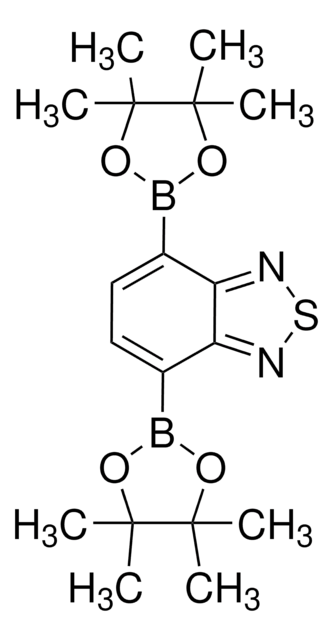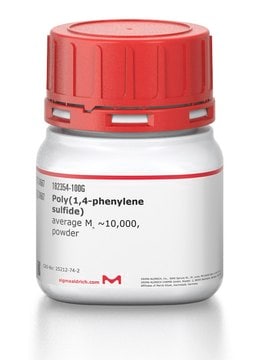Unfortunately, the number of repeat units is not determined. The inherent and reduced viscosities are 0.512 and 0.526 dL/g, respectively. The viscosities are measured by dissolving the product in concentrated sulfuric acid to form a solution with a concentration of 0.0998 g/dL at 25°C.
667846
BBL
Synonym(s):
Poly(benzimidazobenzophenanthroline)
Select a Size
Select a Size
About This Item
Recommended Products
description
Band gap: 1.9 eV
Quality Level
form
solid
Orbital energy
HOMO -5.9 eV
LUMO -4.0 eV
OPV Device Performance
ITO/MEH-PPV/BBL/Al
- Short-circuit current density (Jsc): 1.98 mA/cm2
- Open-circuit voltage (Voc): 0.93 V
- Fill Factor (FF): 0.47
- Power Conversion Efficiency (PCE): 1.1 %
ITO/PPV/BBL/Al
- Short-circuit current density (Jsc): 2.15 mA/cm2
- Open-circuit voltage (Voc): 1.1 V
- Fill Factor (FF): 0.5
- Power Conversion Efficiency (PCE): 1.5 %
semiconductor properties
N-type (mobility=0.1 cm2/V·s)
P-type (mobility=0.4 cm2/V·s)
Storage Class Code
11 - Combustible Solids
WGK
WGK 3
Flash Point(F)
Not applicable
Flash Point(C)
Not applicable
Personal Protective Equipment
Choose from one of the most recent versions:
Already Own This Product?
Find documentation for the products that you have recently purchased in the Document Library.
Articles
Intrinsically stretchable active layers for organic field-effect transistors (OFET) are discussed. Polymer structural modification & post-polymerization modifications are 2 methods to achieve this.
Thin, lightweight, and flexible electronic devices meet widespread demand for scalable, portable, and robust technology.
Professor Chen (Nankai University, China) and his team explain the strategies behind their recent record-breaking organic solar cells, reaching a power conversion efficiency of 17.3%.
-
Hello, What is the number of repeat unit or viscosity of this polymer?
1 answer-
Helpful?
-
-
Is there any molecular weight information available for the BBL polymer (item # 667846)?
1 answer-
The molecular weight for this product is not determined. However, historical data suggest that it is 304.2 g/mol.
Helpful?
-
-
Hello, what is the viscosity (or number of repeat units) of this polymer?
1 answer-
The viscosity of this material is not tested on a lot-to-lot basis. However, historical data indicates an intrinsic viscosity of approximately 1.6 dl/g in Methanesulfonic acid at 25°C.
Helpful?
-
Active Filters
Our team of scientists has experience in all areas of research including Life Science, Material Science, Chemical Synthesis, Chromatography, Analytical and many others.
Contact Technical Service![Naphtho[1,2-c:5,6-c′]bis[1,2,5]thiadiazole-5,10-diboronic acid bis(pinacol) ester 95%](/deepweb/assets/sigmaaldrich/product/structures/396/334/bb0914db-5c9a-4565-ba76-30dd4bc4ba87/640/bb0914db-5c9a-4565-ba76-30dd4bc4ba87.png)








